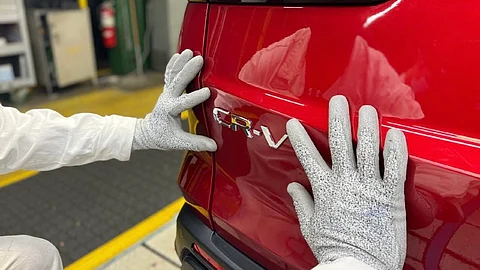

It could rightly be called a car crash in slow motion.
In a major blow to Canada’s electric vehicle ambitions and a signal of worsening conditions in the global auto industry, Japan’s Honda Motor Co. has postponed a much-hyped — and subsidized — $15-billion electric vehicle (EV) plant in Ontario.
The decision, prompted by a sharp downturn in EV demand and mounting economic uncertainty from U.S. President Donald Trump’s new tariffs on foreign-made automobiles, has cast doubt over the viability of publicly subsidized EV manufacturing in Canada.
The Alliston-based project — touted as a transformative supply chain development when it was announced to much fanfare in April 2024 — was the latest in a wave of nearly $50 billion in government-supported EV initiatives across Ontario and Quebec.
It was expected to create 1,000 new jobs and secure 4,200 existing ones, while enabling the production of up to 240,000 EVs annually by 2028.
But Honda announced Tuesday it will delay the venture for “approximately two years,” citing weakening market conditions.
“Due to the recent slowdown of the EV market, Honda Motor has announced an approximate two-year postponement of the comprehensive value chain investment project in Canada,” spokesperson Ken Chiu said in a statement. “The company will continue to evaluate the timing and project progression as market conditions change.”
The announcement followed Honda’s financial results showing a staggering 59% drop in annual profit, down to 500 billion yen ($4.73 billion), and an admission that Trump’s escalating trade war — particularly tariffs on Canadian- and Mexican-built cars — will wipe out over $4.4 billion from the company’s operating profits next year.
The news lands hard in Ontario, which had ponied up to $2.5 billion in direct and indirect subsidies to support Honda’s investment, matching a similar sum from Ottawa.
Speaking in Pickering on Tuesday, Premier Doug Ford, attempted to keep a stiff upper lip while vowing to hold automakers to account for public dollars.
“We’re going to hold them accountable, each auto-manufacturer,” Ford said. “We’re going to make sure they continue manufacturing automobiles here in Ontario.”
Ford said Honda executives have assured him the company remains committed to its Canadian operations.
But the project’s indefinite deferral adds to growing economic uncertainty in the province’s automotive sector.
General Motors recently announced layoffs at its Oshawa facility, and Ontario’s forthcoming budget is expected to allocate significant funds to critical mineral development in anticipation of EV growth.
“This is a serious reminder that public money invested in private industry comes with risk,” said Flavio Volpe, president of the Automotive Parts Manufacturers’ Association. “Until the trade environment stabilizes, companies like Honda will hesitate—and we’re the ones left holding the bag.”
Honda’s move is part of a broader recalibration by global automakers struggling with rising Chinese competition and wavering consumer interest in electric vehicles.
The company had been seen as a late but serious entrant into the EV market, and its Canadian expansion was framed as a cornerstone of its global electrification strategy.
In Tokyo, Honda executives said they would be forced to “very carefully” reconsider global investment plans, with an eye on shifting production to US facilities to mitigate tariff exposure.
“We will definitely look for new directions of growth through strategic partnerships,” Honda CEO Toshihiro Mibe said, confirming that merger talks with Nissan had collapsed earlier this year.
Critics warn that Honda’s decision is a wake-up call about the scale of public risk behind Canada’s EV manufacturing push. Combined federal and provincial subsidies for EV battery plants, including major deals with Stellantis and Volkswagen, now total nearly $50 billion.
“It raises fundamental questions about whether EV manufacturing in Canada is viable in this political climate,” said one industry analyst. “If these companies walk away, taxpayers don’t get a refund.”
Despite assurances that current employment at Honda’s Alliston plant won’t be affected, the delay throws cold water on Canada’s vision to become a North American EV powerhouse.
“We’re very confident that we’ll continue producing Honda vehicles here in Ontario,” Ford insisted Tuesday.
